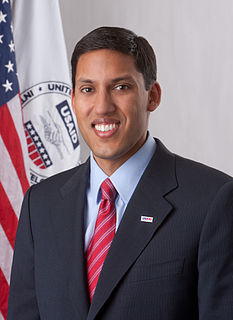A Quote by Tom Vilsack
Technology has allowed us to have more drought-resistant crops. The spotty nature of drought, the spotty nature of rains can sometimes result in better yields than anticipated.
Related Quotes
There's a lot of research that suggests that organic yields are close or superior to conventional yields depending on factors like climate. In a drought year an organic field of corn will yield more - considerably more - than a conventional field; organic fields hold moisture better so they don't need as much water. It simply isn't true that organic yields are lower than conventional yields.
Nowhere is this challenge more critical -- and the need for action more pressing -- than in the Horn of Africa. From Kenya to Ethiopia, Djibouti to Somalia, the devastating consequences of drought, desertification and land degradation are playing out before our eyes. The worst drought in 60 years has placed more than 13.3 million people -- predominately women and children -- in need of emergency assistance.
Technology is neutral and sterile. Now, technology is the nature of modern man; it is our environment and our horizon. Of course, every work of man is a negation of nature, but at the same time, it is a bridge between nature and us. Technology changes nature in a more radical and decisive manner: it throws it out.
We also look at farming. Are we making sure that we're getting the latest seeds out to women so they can get a bigger yield off of their farms? A new type of seed that gets out to a man, let's say, that's drought resistant - because, of course, the rains are changing in Africa with climate change - if you don't put it in the hands of a woman, she won't necessarily get it. We look at breaking down all those barriers.
Even in our own agriculture strategy, if we got a great new drought-resistant seed and we managed to get it distributed in the system, we just assumed that it would reach female farmers. That's a false assumption, because women don't interact with agro-dealers. So if you don't develop specific programming to ensure that seed gets in a woman's hands, then the extra income [generated by higher-yielding crops] goes into her husband's hands.
A worm is as good a traveler as a grasshopper or a cricket, and a much wiser settler. With all their activity these do not hop away from drought nor forward to summer. We do not avoid evil by fleeing before it, but by rising above or diving below its plane; as the worm escapes drought and frost by boring a few inches deeper.
































